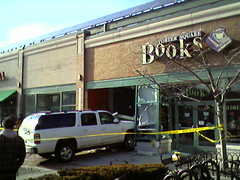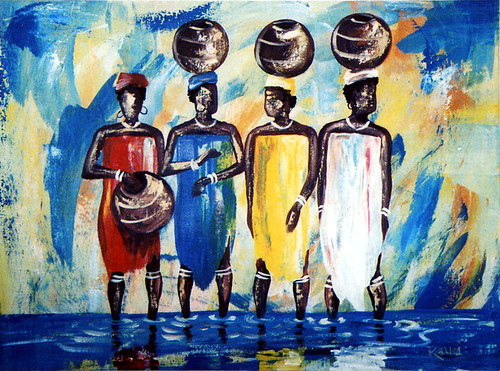Identity Theft
It was a minor footnote last summer, but for any Ghanaian who read reports of the capture of those alleged to be behind the July 21st bombings in London (the second wave that failed), there was a sentence that struck ungodly fear. It was that sinking feeling that disaster had hit home. I'll recount the episode in the spirit of Four Women by Nina Simone, as a stripped-down tale.
Part 2 of the Things Fall Apart series...
Four Men
32 years old, Wednesday born
Bright as hell, sky's the limit
Family's establishment back home
Immigrant life: London,
God save the Queen.
Dirty Pretty Thing
Ceaseless hustle:
Day job, night jobs,
Live in bedsits,
Sleep in shifts.
A tough life,
Invisible to all
Hostel life: hostile life.
Anomie, angst, stress
Exhausted, mental breakdown
Check yourself in
Hospital: Asylum Down
Sleep. Finally. Sleep.
Medicine, try to get better
Wake up one day
They say you're a bomber
No! Not true!
Your name is stranger
Deputy Inspector General of Police
Big title, Big Man in Ghana
Exemplary career, promotion looms:
Big smile, Big plans, Big politics
A Big Man might get bigger
They say your son is missing
London, dropped out of sight
Fragile thing, you miss him
Head to London, unpaid leave
Search everywhere, he's lost.
No one knows, clean disappeared
Shadow world. Immigrants.
Weeks pass, must head home
Job calls, next IGP
Worried, daily calls. Then:
Hear it on the radio
Read it in the papers
They say it's your son
Headline: Bomber. Al Qaeda.
Impossible. A father knows.
Can't be true.
Your name is concerned
32 years old, Wednesday born
Sky's the limit
Family's establishment back home
Diaspora: Boston, Tea Party
Big Blue technology
You write toli
Long, winding pieces
Everything and nothing
Prognosticator, opinions galore
Worry about this world
Cry wolf: queasiness
You see train-wrecks everywhere
Eritrean Mujaheedeen?
You sigh: prescience, You called it
Two days later: new developments
Read a name, recognition.
One of the bombers
The Name. Twi interpreter.
A countryman. Country! Man!
32 years old. Wednesday born.
Shock, horror, depression
Your name is crushed
You lived with him
You stole his name
NHS card, easy prey
Signed up for nihilism
Secrets. Compartmentalized.
Saw the carnage
Waited
Two weeks later: your turn
Rucksack, carry the bomb
Spotted? Too risky?
Call it off
Drop the backpack in the park
Run. Hide. Lay low.
They broke up the plot
Caught you, damn.
Stand in court
"No speak English"
Keep up the pretense:
Ask for an interpreter
Stick to the story, the name
Don't say nothing
They trained you well
Your name is cursed
State of Shock
It was a man's worst nightmare. It was a father's worst nightmare. It was a country's worst nightmare. It appeared that the thing named terrorism, or should one capitalize it - Terrorism, that damned thing, had been wrought by a native son.
The July bombings in London were deeply shocking and troubling even as such acts go. They had additional resonance for Ghanaians, even those who weren't Londoners. The city has long been a destination of choice for us, indeed in our slang it is fondly called Babylon, reflecting a long, shared history. The great shopping street in Osu, Accra is called Oxford Street. Many of us have relatives there and we took it personally. In the aftermath of July 7th, it was no surprise to learn that Ghanaians were amongst the many casualties. That made sense, we are part-and-parcel of the London brew. From the students to the businessmen, from the minicab drivers, nurses, lawyers, doctors, street cleaners, ticket collectors, journalists, from the rich to the poor, we are all Londoners. We were all in mourning.
And then we heard that a Ghanaian may have been responsible - "charged over an unexploded device found at Little Wormwood Scrubs park in West London".
Thus our grief turned into incredulity. Yet there was also apprehension. In a global village, anything is plausible. Al Qaeda switching up the ethnic profile of their foot-soldiers would be smart. We instinctively know that no society is immune to such things and indeed, given the right conditioning, anyone can be radicalized. We had even glimpsed those frayed edges in our own society. Take those youngsters with the Bin Laden t-shirts on the streets, heck I'd even written about how distressed it had made me. Geoffrey Hiller managed to capture that image in his remarkable photo essay and that was just one man's West African road trip. Of course there were other indicators notably that hush-hush story about the security services in Ghana breaking up a group in Kumasi attempting to recruit for jihad... Well, hush-hush.
But still, but still...
We are a proud people but also conflicted. Our disbelief turned into shame (which is still one of the strongest impulses in our society) but also, and significantly, into cold calculation. We have enough problems in our society that we can't afford the stain of terrorism. We could all see it happening, the stigma that attaches itself to a community when a disastrous label is flung at it. We are experienced in negative branding from the economic to the racial and worse. We know all about profiling; the curse of low expectations and insouciant sidelining is our daily bread. Still it is another step to imagine travel as a Palestinian, Libyan, Saudi, Egyptian, Chechen or any of those other peoples have traveled in past decades (or years for some). Our reaction was a little hypocritical and verging on the narcissistic, but then we are only human; who wants to be collateral damage?
Resolution
As you might expect, the Ghanaian community in London rallied and investigated the issue. A father headed to London to redouble his search for his missing son (or to secure a lawyer if necessary). Everybody pitched in and we crossed our fingers. It took a couple of weeks but they eventually found the man in hospital. He had been living the anonymous immigrant life in a hostel outside London and had "fallen ill". The English police were informed, but being quite happy that they had the right bomber in custody, were not concerned about correcting the public record. Indeed despite the Ghanaian embassy's prompts for a public exoneration of man and country, the only thing that has been said is that "an official statement will be issued in due course".
No one knows the identity of this man who performed the identity theft. The best we know from the accounts in the Ghanaian community is that this is someone who lived in the same building as an acquaintance of the Ghanaian at a certain point. Thus the connection was tenuous, opportunistic and the most awful serendipity. He had been living under this assumed name for over a year, even leasing property in that name.
The second wave of London bombers, the July 21st group, are believed to be a cell from the Horn of Africa, from Eritrea, Somalia and Tanzania. The first wave was comprised of locals Brits albeit of Pakistani and Jamaican descent, still: Brits to the core. The mystery remains as to the ethnicity of that man I call cursed. The cover story that one of them released was that they were simply copycats - they "never intended to cause any harm". [Obscenity]. Of course, more likely is that it is just luck that their bombs didn't go off as planned - the bombmaker had a bad day, made a bad batch. Regardless, there will be no mitigating circumstances, they will never see a day of freedom.
The accounts in the Ghanaian press, which are the only ones that concerned themselves about this story, are curiously deficient. Our journalists aren't intrepid, persistent or imaginative. It was enough for them to get confirmation that the bomber was not that particular Ghanaian. They didn't ask follow-on questions about the wider story. For example the Twi interpreter would have been able to definitively say if indeed the bomber was Ghanaian. The acquaintance would have been able to describe the man etc. But beyond that, there has been almost no follow-up reporting about the July 21st bombings in the press (English or Ghanaian) and much could be shaken loose from the strands on display here. Even if they confined themselves to the narrow Ghanaian angle, there is much left unsaid and what has been said is elliptical at best. In many ways, the reports raise more questions than they answer: the missing passport, the "health problems" and so on. Suffice to say that the story being told in the Ghanaian community is different from the official accounts. But perhaps enough scrutiny has been brought to bear on a man, his family and a country. We had dodged a bullet of infamy and wanted to return to the normalcy of our relative anonymity.
I, on the other hand, suffer from the journalistic impulse and want to know about the back story. I want to vocalize the story of what might be the ultimate identity theft, the worst case scenario. Who are these people after all? I want to outline the life in those hostels, that lonely life on the fringe. I understand how easy it is to fall through the cracks, to drop out of sight, from brother, from father and from friends. I have known the bright immigrants, Master's degrees and all, falling into these ruts, preferring to hustle, to juggle menial jobs, and refusing to return until they "make it" somehow, someday. I have seen the double and triple lives Ghanaians in London can lead. I have seen the mental breakdowns and worse; it is no fun picking up those pieces. True, it is not just stagnation, there are also many triumphs. Regardless, these stories are worth telling.
I am interested also in capturing the essence of that very pragmatic and practical response we had for a few weeks last summer: an almost hypocritical yet instinctive turn to self-preservation. Why is it better to know that the bomber was not Ghanaian? Does it lessen our grief? And why Schadenfreude instead of solidarity for Somalis or Eritreans? How much better will we be treated at airports? We are harassed and worse already, tarred with the same brush - Africans, the people darker than blue as the song goes. Our playgrounds are in that school of hard knocks. Why that lingering sense of relief? For that matter, is our house in order and can we hold our heads high about our current situation? More to the point, it was somebody's son after all. For all I know, the bomber, like the man whose identity he stole, or indeed like myself, was also Ghanaian, 32 years old and Wednesday born.
It all goes to show that our grip is tenuous and we can become unhanded in a single moment. A simple case of identity theft perhaps, a temporary inconvenience and fright, or, to return to the theme of this series, a sideshow lending weight to the notion that
"Things fall apart; The center cannot hold."
The Hustle, a playlist
A soundtrack for this note... I always have music in mind as I write and these songs were today's motivation. The first two feature metronomic beats and dancefloor agitation, the last two a pause for mournful reflection.
- Common - The Hustle
My eyes watch god from a place
Where times is hard, hard times we embrace - Alexander O'Neal - Fake
Your name was Patty, but now it's Kate
Girl you seem to change it everyday
Your hair was long, but now it's short
You said "I got it cut", but I don't see no hair on the floor - Nina Simone - Four Women
Between two worlds
I Do Belong - John Coltrane - Alabama
The most poignant musical response to the slaughter of innocents.
Next in part 3: Africa, 1966
See also: Of No Fixed Abode and Ode to Betty Brown for more on the July London bombings.
File under: Ghana, London, bombing, identity, reflection, observation, globalization, Africa, culture, terrorism, immigration, life, Schadenfreude, journalism, branding, perception, anomie, storytelling, Things Fall Apart, toli




No comments:
Post a Comment